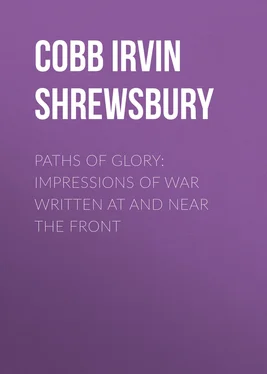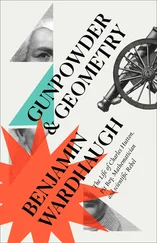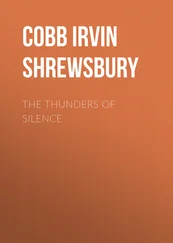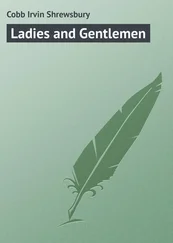Irvin Cobb - Paths of Glory - Impressions of War Written at and Near the Front
Здесь есть возможность читать онлайн «Irvin Cobb - Paths of Glory - Impressions of War Written at and Near the Front» — ознакомительный отрывок электронной книги совершенно бесплатно, а после прочтения отрывка купить полную версию. В некоторых случаях можно слушать аудио, скачать через торрент в формате fb2 и присутствует краткое содержание. Жанр: prose_military, История, foreign_edu, foreign_antique, foreign_prose, на английском языке. Описание произведения, (предисловие) а так же отзывы посетителей доступны на портале библиотеки ЛибКат.
- Название:Paths of Glory: Impressions of War Written at and Near the Front
- Автор:
- Жанр:
- Год:неизвестен
- ISBN:нет данных
- Рейтинг книги:3 / 5. Голосов: 1
-
Избранное:Добавить в избранное
- Отзывы:
-
Ваша оценка:
- 60
- 1
- 2
- 3
- 4
- 5
Paths of Glory: Impressions of War Written at and Near the Front: краткое содержание, описание и аннотация
Предлагаем к чтению аннотацию, описание, краткое содержание или предисловие (зависит от того, что написал сам автор книги «Paths of Glory: Impressions of War Written at and Near the Front»). Если вы не нашли необходимую информацию о книге — напишите в комментариях, мы постараемся отыскать её.
Paths of Glory: Impressions of War Written at and Near the Front — читать онлайн ознакомительный отрывок
Ниже представлен текст книги, разбитый по страницам. Система сохранения места последней прочитанной страницы, позволяет с удобством читать онлайн бесплатно книгу «Paths of Glory: Impressions of War Written at and Near the Front», без необходимости каждый раз заново искать на чём Вы остановились. Поставьте закладку, и сможете в любой момент перейти на страницу, на которой закончили чтение.
Интервал:
Закладка:
Only one man in all the line hailed us. Speaking so low that we could scarcely catch his words, he said in broken English:
"M'sieurs, the French are in Brussels, are they not?"
"No," we told him.
"The British, then—they must be there by now?"
"No; the British aren't there, either."
He shook his head, as though puzzled, and started on.
"How far away are the Germans?" we asked him.
He shook his head again. "I cannot say," he answered; "but I think they must be close behind us. I had a brother in the army at Liege," he added, apparently apropos of nothing. And then he went on, still shaking his head and with both arms tightly clasped round a big bundle done up in cloth, which he held against his breast.
Very suddenly the procession broke off, as though it had been chopped in two; and almost immediately after that the road turned into a street and we were between solid lines of small cottages, surrounded on all sides by people who fluttered about with the distracted aimlessness of agitated barnyard fowls. They babbled among themselves, paying small heed to us. An automobile tore through the street with its horn blaring, and raced by us, going toward Brussels at forty miles an hour. A well-dressed man in the front seat yelled out something to us as he whizzed past, but the words were swallowed up in the roaring of his engine.
Of our party only one spoke French, and he spoke it indifferently. We sought, therefore, to find some one who understood English. In a minute we saw the black robe of a priest; and here, through the crowd, calm and dignified where all others were fairly befuddled with excitement, he came—a short man with a fuzzy red beard and a bright blue eye.
We hailed him, and the man who spoke a little French explained our case. At once he turned about and took us into a side street; and even in their present state the men and women who met us remembered their manners and pulled off their hats and bowed before him.
At a door let into a high stone wall he stopped and rang a bell. A brother in a brown robe came and unbarred the gate for us, and our guide led us under an arched alley and out again into the open; and behold we were in another world from the little world of panic that we had just left. There was a high-walled inclosure with a neglected tennis court in the middle, and pear and plum trees burdened with fruit; and at the far end, beneath a little arbor of vines, four priests were sitting together. At sight of us they rose and came to us, and shook hands all round. Almost before we knew it we were in a bare little room behind the ancient Church of Saint Jacques, and one of the fathers was showing us a map in order that we might better understand the lay of the land; and another was uncorking a bottle of good red wine, which he brought up from the cellar, with a halo of mold on the cork and a mantle of cobwebs on its sloping shoulders.
It seemed that the Rev. Dom. Marie-Joseph Montaigne—I give the name that was on his card—could speak a little English. He told us haltingly that the smoke we had seen came from a scene of fighting somewhere to the eastward of Louvain. He understood that the Prussians were quite near, but he had seen none himself and did not expect they would enter the town before nightfall. As for the firing, that appeared to have ceased. And, sure enough, when we listened we could no longer catch the sound of the big guns. Nor did we hear them again during that day. Over his glass the priest spoke in his faulty English, stopping often to feel for a word; and when he had finished his face worked and quivered with the emotion he felt.
"This war—it is a most terrible thing that it should come on Belgium, eh? Our little country had no quarrel with any great country. We desired only that we should be left alone.
"Our people here—they are not bad people. I tell you they are very good people. All the week they work and work, and on Sunday they go to church; and then maybe they take a little walk.
"You Americans now—you come from a very great country. Surely, if the worst should come America will not let our country perish from off the earth, eh! Is not that so?"
Fifteen minutes later we were out again facing the dusty little square of Saint Jacques; and now of a sudden peace seemed to have fallen on the place. The wagons of a little traveling circus were ranged in the middle of the square with no one about to guard them; and across the way was a small tavern.
All together we discovered we were hungry. We had had bread and cheese and coffee, and were lighting some very bad native cigars, when the landlord burst in on us, saying in a quavering voice that some one passing had told him a squad of seven German troopers had been seen in the next street but one. He made a gesture as though to invoke the mercy of Heaven on us all, and ran out again, casting a carpet slipper in his flight and leaving it behind him on the floor.
So we followed, not in the least believing that any Germans had really been sighted; but in the street we saw a group of perhaps fifty Belgian soldiers running up a narrow sideway, trailing their gun butts behind them on the stones. We figured they were hurrying forward to the other side of town to help hold back the enemy.
A minute later seven or eight more soldiers crossed the road ahead of us and darted up an alley with the air and haste of men desirous of being speedily out of sight. We had gone perhaps fifty feet beyond the mouth of this alley when two men, one on horseback and one on a bicycle, rode slowly and sedately out of another alley, parallel to the first one, and swung about with their backs to us.
I imagine we had watched the newcomers for probably fifty seconds before it dawned on any of us that they wore gray helmets and gray coats, and carried arms—and were Germans. Precisely at that moment they both turned so that they faced us; and the man on horseback lifted a carbine from a holster and half swung it in our direction.
Realization came to us that here we were, pocketed. There were armed Belgians in an alley behind us and armed Germans in the street before us; and we were nicely in between. If shooting started the enemies might miss each other, but they could not very well miss us. Two of our party found a courtyard and ran through it. The third pressed close up against a house front and I made for the half-open door of a shop.
Just as I reached it a woman on the inside slammed it in my face and locked it. I never expect to see her again; but that does not mean that I ever expect to forgive her. The next door stood open, and from within its shelter I faced about to watch for what might befall. Nothing befell except that the Germans rode slowly past me, both vigilantly keen in poise and look, both with weapons unshipped.
I got an especially good view of the cavalry. He was a tall, lean, blond young man, man with a little yellow mustache and high cheekbones like an Indian's; and he was sunburned until he was almost as red as an Indian. The sight of that limping French dragoon the day before had made me think of a picture by Meissonier or Détaille, but this German put me in mind of one of Frederic Remington's paintings. Change his costume a bit, and substitute a slouch hat for his flat-topped lancer's cap, and he might have cantered bodily out of one of Remington's canvases.
He rode past me—he and his comrade on the wheel—and in an instant they were gone into another street, and the people who had scurried to cover at their coming were out again behind them, with craned necks and startled faces.
Our group reassembled itself somehow and followed after those two Germans who could jog along so serenely through a hostile town. We did not crowd them—our health forbade that—but we now desired above all things to get back to our taxicab, two miles or more away, before our line of retreat should be cut off. But we had tarried too long at our bread and cheese.
Читать дальшеИнтервал:
Закладка:
Похожие книги на «Paths of Glory: Impressions of War Written at and Near the Front»
Представляем Вашему вниманию похожие книги на «Paths of Glory: Impressions of War Written at and Near the Front» списком для выбора. Мы отобрали схожую по названию и смыслу литературу в надежде предоставить читателям больше вариантов отыскать новые, интересные, ещё непрочитанные произведения.
Обсуждение, отзывы о книге «Paths of Glory: Impressions of War Written at and Near the Front» и просто собственные мнения читателей. Оставьте ваши комментарии, напишите, что Вы думаете о произведении, его смысле или главных героях. Укажите что конкретно понравилось, а что нет, и почему Вы так считаете.












